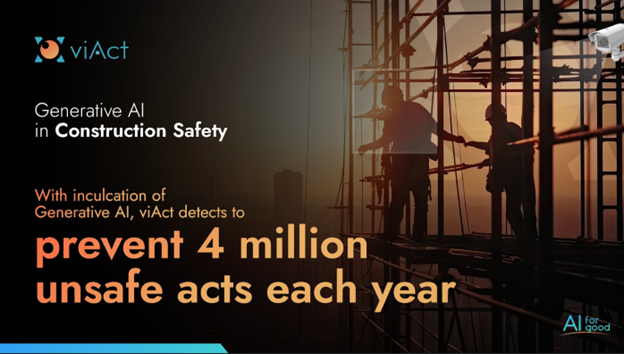With the introduction of generative AI in the construction industry, this has historically been characterized by manual processes and sequential workflows, is going through a different change. This cutting-edge technology is redefining design, planning, and project management through the use of algorithms to develop efficient solutions. This leads to enhanced productivity, creativity, and cost-effectiveness. With limited system access and data transfer, the responsible vision intelligence of viAct strictly complies with GDPR privacy and data protection rules. Targeted safety initiatives are also focused so as to build the system strong.
Let’s delve into why generative AI is changing the landscape of modern construction:
· Innovation
Engineers and architects can investigate a wide range of design options as to generative AI's exceptional ability to produce numerous design iterations quickly. AI algorithms can provide optimum designs that satisfy certain needs by receiving inputs of particular characteristics and limitations, such as material kinds, spatial requirements, budgetary restraints, and environmental circumstances.
Complex geometries and structures that are both aesthetically beautiful and sound structurally can be created with generative design techniques. This skill is especially useful for sustainable architecture, where reducing environmental impact and maximizing energy efficiency are essential.
· Structural safety
When building, it is crucial to ensure the stability and safety of the constructions through Safety Compliance Software. By modeling and forecasting the behavior of diverse materials and structural configurations under changed circumstances, generative AI aids in structural analysis. By assisting engineers in anticipating problems and taking proactive measures to address them, this predictive capability lowers the likelihood of structural failures.
Large volumes of data from past projects, such as stress testing, material characteristics, and environmental conditions, can be analyzed by AI-powered technologies to forecast the performance of new designs. By offering solid, dependable assessments that are supported by evidence, this data-driven strategy not only improves safety but also expedites the approval process for regulatory authorities.
· Project Management
Project planning and management are being revolutionized by generative AI, which optimizes logistics, resource allocation, and timelines. Building projects are infamously complicated since they include a lot of different parties, deadlines, and dependencies. These factors can be analyzed by AI algorithms, which can then produce project plans that are optimized to reduce delays and cost overruns.
· Cost Budgeting
Any construction project's success depends on precise cost estimation. To produce accurate cost estimates, generative AI can examine industry trends, project specifications, and historical cost data. This feature ensures that projects stay below budget by assisting stakeholders and project managers in making well-informed decisions.
Cost-estimating solutions powered by AI have the capacity to continually learn from fresh data, increasing their accuracy over time. Real-time modifications and improvements are possible due to this iterative learning process, which guarantees that estimations are accurate and relevant throughout the duration of the project.
· Enhancing communication
Different teams from many places commonly work on construction projects. Better cooperation and communication can be facilitated by generative AI by offering a centralized platform where all project stakeholders can access current project information. Artificial intelligence-powered technologies can produce simulations and visuals that assist teams in comprehending intricate designs and building processes, improving communication and minimizing misunderstandings.
Conclusion
The application of generative AI in the construction sector is transforming conventional methods and promoting economy, creativity, and efficiency. Artificial Intelligence (AI) is tackling some of the biggest problems in construction by improving design, improving structural safety, simplifying project management, and producing precise cost predictions. AI can automate repetitive communication duties, including reminding people to send updates, freeing up human resources for more creative and strategic work. This increases output overall and guarantees that everyone in the team is aware and in agreement.
Social Media:-
Facebook -viactai
Twitter — aiviact
Instagram — viactai/
Youtube- viactai\
Linkedin — viactai
Blog ~
Automated Construction Monitoring Meet the Needs of Modern Construction
Advancing Construction Field Management Software with Generative AI





Comments